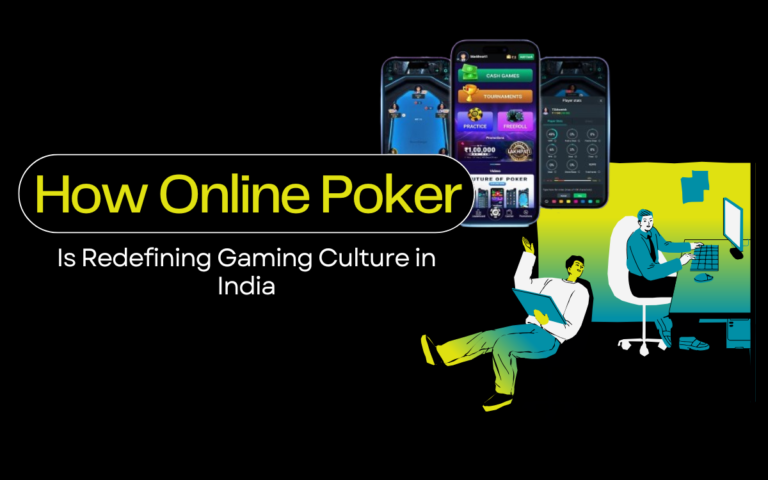The Future of Online Poker in India: Trends to Watch in 2025
Online poker has emerged as a compelling component of India’s rapidly growing digital gaming industry. As internet penetration deepens, smartphones become ubiquitous, and real-money gaming gains legitimacy, poker is transforming from a niche pastime into a mainstream form of entertainment. The year 2025 is expected to be a pivotal moment for online poker in India, shaped by legal reforms, technological advancements, and the rise of the Best Rummy game, along with shifting cultural attitudes. This article explores the most significant trends set to influence the future of online poker in the country.

1. Regulatory Evolution and Legal Clarity
One of the most critical factors shaping online poker’s future in India is the legal environment. Currently, the regulation of online poker is ambiguous and varies across states. While states like Nagaland and Sikkim have issued licenses for online games of skill, other regions remain hesitant or outright prohibitive.
However, 2025 could mark a turning point. The central government is reportedly considering uniform regulations for online gaming, which would offer much-needed clarity. If poker continues to be recognized as a game of skill, as upheld by several high courts, it may gain broader acceptance alongside games like Teen Patti Stars. Regulatory standardization could boost investor confidence, attract international operators, and protect players through safeguards such as KYC (Know Your Customer) protocols, responsible gaming policies, and secure payment systems.
2. Increased Smartphone Penetration and Mobile Gaming
India’s mobile-first internet culture continues to fuel the rise of online poker. By 2025, over 900 million Indians are expected to own smartphones, a significant percentage of whom will use them for mobile gaming. Affordable data plans, improved connectivity through 5G networks, and the availability of low-cost smartphones will make it easier for people from Tier II and Tier III cities to access online poker platforms.
Mobile-first poker apps are being designed with intuitive interfaces, quick loading times, and seamless integration with digital wallets. As poker platforms adapt to regional languages and preferences, they are likely to reach untapped demographics, expanding the game’s user base across the socio-economic spectrum.
3. Gamification and Immersive Experiences
Gamification is a growing trend in online poker, and it will become even more pronounced in 2025. Platforms are moving beyond the traditional poker table by introducing challenges, leaderboards, achievement badges, and loyalty programs. These elements keep users engaged, encourage repeat visits, and offer an experience that mimics video games more than conventional card games.
In addition, the advent of augmented reality (AR) and virtual reality (VR) is set to revolutionize online poker. Some platforms are already experimenting with VR poker rooms where players can interact using avatars in 3D environments. As the cost of VR headsets declines and the technology becomes more accessible, Indian players may soon enjoy poker site experiences that blur the line between virtual and real.
4. Rise of Influencer and Social Poker
In 2025, online poker is expected to become increasingly social. Influencers and content creators are starting to play a key role in promoting the game through live streams, tutorial videos, and tournaments. Platforms are investing in community-building tools, such as integrated chat features, clubs, and social leaderboards.
Twitch-style poker streams and YouTube tournaments are attracting younger audiences who see poker as both a game and a form of entertainment. Collaborations between poker platforms and Indian gaming influencers will be instrumental in reshaping the image of poker from gambling to skill-based competition.
5. AI and Data-Driven Personalization
Artificial Intelligence (AI) and data analytics are transforming how poker platforms operate. In 2025, expect highly personalized user experiences based on data-driven insights. AI will be used not only for player recommendations and match-making but also for detecting fraud, promoting responsible gaming, and analyzing player behavior to suggest appropriate content or limits.
Advanced AI algorithms can identify irregular patterns or bots, enhancing the fairness and integrity of online games. At the same time, players will receive tailored content—such as strategy tips, skill-building tools, or event suggestions—based on their playing history and preferences.

6. Professionalization and Competitive Ecosystem
The Indian poker scene is also witnessing a shift toward professionalization. With increased visibility and prize pools, more players are considering poker as a part-time or full-time profession. The emergence of structured poker leagues, sponsored teams, and celebrity ambassadors is helping to legitimize the game.
By 2025, India may host more internationally recognized online poker tournaments, possibly integrated with global circuits. These events will not only boost the Indian poker ecosystem but also attract overseas players, enhancing competitiveness and cross-border collaboration.
7. Blockchain Integration and Crypto Payments
Though still nascent, blockchain technology and cryptocurrency could play a more prominent role in Indian online poker by 2025. Blockchain can enhance transparency and fairness through provably fair algorithms and decentralized gaming models. Meanwhile, cryptocurrencies could offer faster, more secure transactions, particularly for cross-border deposits and withdrawals.
However, the adoption of these technologies depends on the evolving regulatory framework. If the Indian government embraces blockchain and crypto within a controlled environment, it could open up new avenues for innovation in online poker platforms and how you manage your bankroll.
8. Localized Content and Regional Expansion
Language localization and cultural adaptation will be crucial for the continued growth of poker in India. With the majority of Indians being non-English speakers, platforms are increasingly offering interfaces and customer support in regional languages such as Hindi, Tamil, Bengali, and Marathi.
Localized tournaments, regional ambassadors, and culturally relevant themes will help poker resonate with a wider audience. Regional influencers and vernacular marketing campaigns will also play a key role in expanding poker beyond metro cities into semi-urban and rural markets.
9. Youth Demographics and Changing Attitudes
India’s youthful population presents a significant opportunity for online poker. As digital natives, Millennials and Gen Z are more likely to embrace online games that require strategic thinking and mental agility. Educational content around the math, logic, and psychology involved in poker can help dismantle misconceptions and promote it as a game of skill.
In 2025, initiatives aimed at creating awareness about responsible gaming, skill development, and the cognitive benefits of poker could make the game more socially acceptable. Parental attitudes and societal norms are gradually shifting as success stories and career poker players gain media attention.
10. Corporate Investment and Industry Consolidation
The growing popularity of online poker is attracting interest from venture capitalists, gaming giants, and entertainment conglomerates. This influx of capital is leading to the professionalization of poker platforms, improved user experiences, and aggressive customer acquisition strategies.
In 2025, we may witness further consolidation in the industry as large players acquire smaller startups to expand their market share and technology portfolio. This consolidation will raise the bar for innovation, compliance, and customer satisfaction, ultimately benefiting players.
Conclusion
The future of online poker in India looks promising for Indian players as we head into 2025. With regulatory frameworks maturing, technology enhancing the user experience, and a younger generation embracing the game, poker is poised to become a key pillar of the Indian gaming industry. Whether you are a player, investor, or enthusiast, the coming years will offer unprecedented opportunities to engage with this dynamic and evolving space. Watching these trends unfold will be as exciting as playing the game itself.







